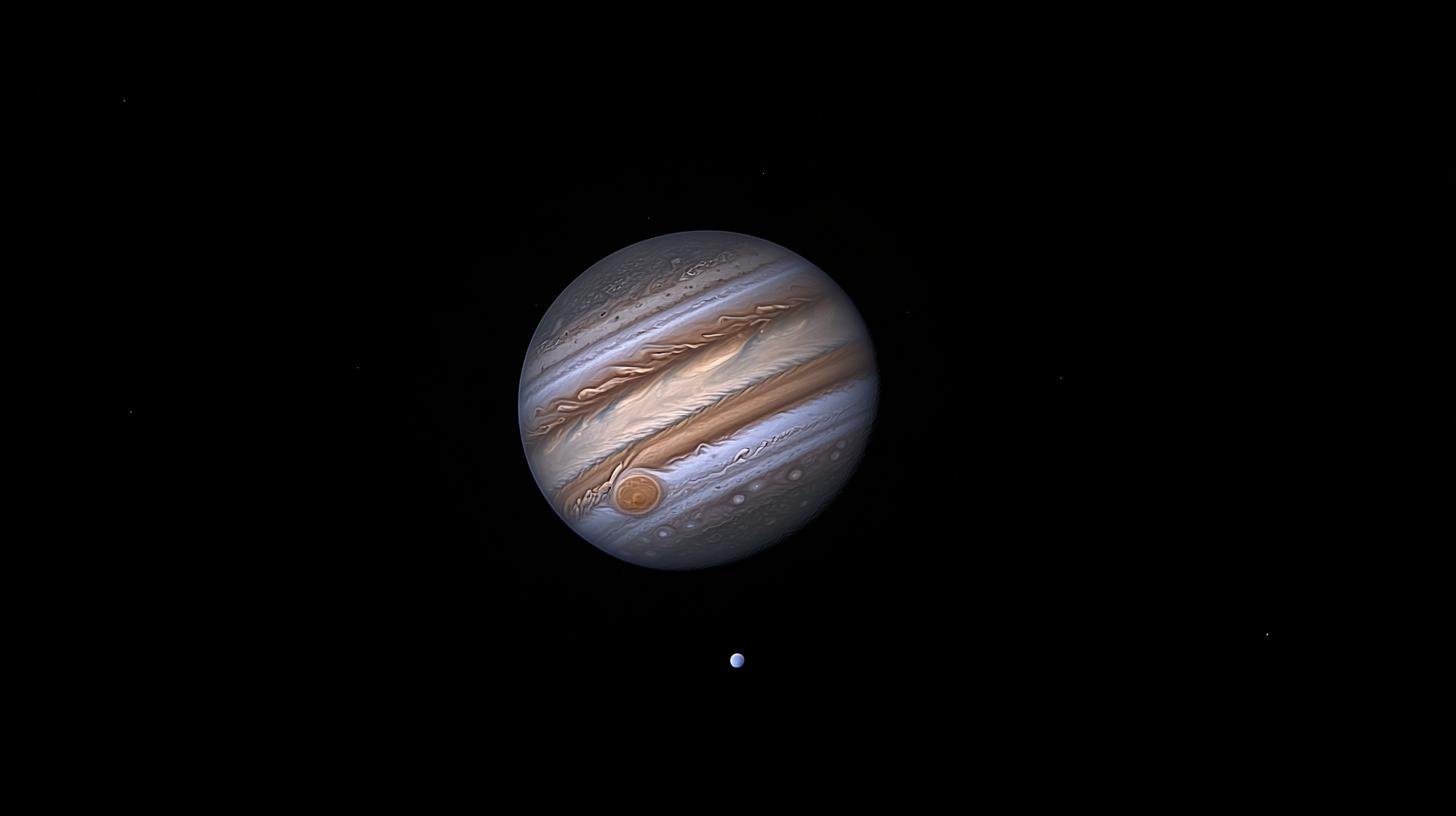Jupiter, the largest planet in our solar system, is poised to put on a spectacular night show. This massive gas giant is stepping into the spotlight, shining brightly in our skies.
Currently, Jupiter graces the eastern horizon right after sunset, glowing brilliantly with an impressive magnitude of -2.8. As Earth moves along its orbit, an astronomical event known as “opposition” is imminent, scheduled for December 8. At this celestial moment, the Sun, Earth, and Jupiter align perfectly, with Earth sandwiched in the middle.
Opposition occurs due to Earth’s shorter orbital period compared to Jupiter’s, positioning us directly between the Sun and the giant planet. This alignment brings Jupiter just 612 million kilometers from Earth, allowing us to admire it in full glory, with sunlight fully illuminating its face toward us.
This event draws near, marking a time when Jupiter’s brightness is unsurpassed. The period surrounding opposition is a prime opportunity for stargazers and astronomers alike to observe Jupiter, whether through telescopes or binoculars. During this special time, Jupiter remains visible throughout the night, rising in the east as the Sun sets and making its way across the sky until it sets in the west.
The analogy of a “full moon” holds true for Jupiter too. At opposition, we witness a “full Jupiter,” as the planet shines round and bright. Jupiter’s orbital period around the Sun is approximately 12 Earth years, with an average distance of about 779 million kilometers from our star. In contrast, Earth orbits the Sun much faster, leading to encounters where our world catches up to Jupiter every 13 months. Don’t miss your chance to marvel at the king of planets this December.
The Giant Leap: How Jupiter’s Opposition is Propelling Human Curiosity and Technological Innovations
Overview
Every 13 months, stargazers on Earth are treated to a celestial spectacle as Jupiter, the largest planet in our solar system, enters a phase known as “opposition.” This astronomical event not only offers a stunning view for enthusiasts but also sparks advances in space exploration technology and influences scientific inquiry into the mysteries of the gas giant. Let’s dive into the lesser-known impacts of this fascinating event on humanity and technology today.
The Science Behind Opposition
When opposition occurs, Earth finds itself perfectly aligned between the Sun and Jupiter. This positions us closer to Jupiter, approximately 612 million kilometers away, compared to the average of 779 million kilometers. Such proximity illuminates Jupiter in striking detail, providing a prime opportunity for both amateur and professional astronomers to study the planet.
Technological Impacts and Advantages
1. Advances in Telescope Technology: Each opposition spurs demand for better telescopic equipment and observational technology. Researchers and tech companies are motivated to develop advanced devices that can capture high-resolution images of Jupiter, aiding in the study of its atmosphere, rings, and moons.
2. Boost to Space Missions: Historical missions like NASA’s Juno spacecraft have taken advantage of opposition to gather valuable data. These missions pave the way for future explorations, such as potential manned missions to Jupiter’s moons, which are now seen as proliferous sites for studying extraterrestrial life.
3. Satellite Communication Improvements: The same technological expertise can transfer to enhancing satellite communication on Earth, furthering our global connectivity and data transmission capabilities.
Advantages and Disadvantages
One of the primary advantages of Jupiter’s opposition is that it raises public interest and funding for scientific research. However, the astronomical event also presents challenges. The demand for cutting-edge technological equipment can lead to increased costs and resource allocation, which may detract from other vital research areas.
Controversies and Curiosities
A controversial topic within the scientific community revolves around the prioritization of space exploration after opposition events. Critics argue that the high expenditure required may interfere with addressing more immediate concerns, such as climate change. On the other hand, proponents highlight the importance of such exploration in fostering new technologies that can ultimately benefit humanitarian efforts.
One curious effect relates to Jupiter’s moons. Some scientists hypothesize that closer encounters during opposition might influence their geological activities, potentially providing new insights into gravitational interactions.
How Will This Affect Humanity’s Future?
The intense focus on Jupiter during opposition times not only helps us to learn more about our solar system but also inspires technological advances that have real-world applications. New findings can drive educational initiatives, increase public engagement in science, and motivate younger generations to pursue careers in STEM fields.
Looking Towards the Stars
Whether you’re a seasoned astronomer or a curious newcomer to the night sky, Jupiter’s looming opposition represents a significant opportunity. Technological innovations fueled by events like this could one day lead to breakthroughs in our understanding of both the universe and our place within it.
For more on space exploration and cutting-edge technology developments, visit NASA and SpaceX.







